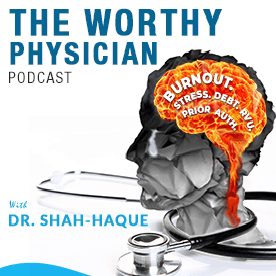Navigating the Complexities of Medicine with Dr. Stephen DeMeo
In a heartfelt and thought-provoking dialogue, Dr. Stephen DeMeo, a neonatologist based in Raleigh, North Carolina, and I explored the intricacies of medical practice, the challenges of work-life balance, the evolving role of technology in healthcare, and the future of medical education. Our candid conversation offers invaluable insights into both the personal and professional dimensions of life in medicine—reminding us that humanity is at the heart of the profession.
The Journey Through Medicine
Dr. DeMeo’s path into neonatology reflects both curiosity and compassion. He describes his specialty as a unique intersection between the intensity of critical care and the deep, longitudinal relationships that form with families of premature and critically ill infants. Each day brings high-stakes medical decision-making, but also moments of joy, resilience, and hope.
What emerges is a theme of balance—between the technical expertise required to manage fragile lives and the emotional resilience necessary to accompany families through their most vulnerable moments. For Dr. DeMeo, that balance is what sustains his career.
The Emotional Landscape of Neonatology
Caring for newborns in crisis places physicians at the emotional epicenter of medicine. Families navigating high-risk pregnancies or unexpected complications face uncertainty, fear, and grief. Dr. DeMeo underscores that one of the most potent tools a physician has is listening.
By taking the time to hear parents’ questions, fears, and even misconceptions, physicians not only ease emotional distress but also build trust. These conversations deepen the physician–family relationship, reminding all involved that medicine is not just about science—it is about human connection.
Supporting Fellow Physicians
The dialogue highlights another often overlooked aspect of medicine: physician-to-physician support. Dr. DeMeo shares experiences of assisting rural pediatricians through neonatal transport, reflecting on the importance of collaboration without judgment.
These moments of solidarity not only save lives but also nurture professional communities. For physicians who often face isolation in demanding roles, camaraderie can be a lifeline. A culture of support allows physicians to lean on one another, reducing burnout and improving patient outcomes.
The Role of Technology in Medicine
Both Dr. DeMeo and Dr. Shah-Haque express cautious optimism about technology’s role in shaping the future of medicine. While electronic health records and administrative tasks often feel burdensome, emerging technologies—particularly artificial intelligence—hold promise.
Rather than replacing physicians, technology may serve as an ally, reducing documentation load and freeing physicians to spend more time at the bedside. For trainees, technology could also reshape medical education, creating adaptive learning platforms that prepare physicians for a rapidly changing healthcare landscape.
Maintaining Identity and Passion in Medicine
Burnout remains one of the most significant challenges facing today’s physicians, especially those in mid-career. Dr. DeMeo encourages physicians to stay anchored in the “why” of medicine: the human connection.
When the demands of the system threaten to erode one’s sense of purpose, leaning into patient interactions can be renewing. A heartfelt conversation with a patient or family often restores perspective, reminding physicians of the meaning that drew them into medicine in the first place.
Rethinking Medical Education
Medical students and residents today face unique pressures: long hours, rising debt, and an increasingly complex healthcare environment. Dr. DeMeo stresses the responsibility of attendings and senior physicians to mentor with empathy.
Teaching medicine is not just about transmitting knowledge; it is about modeling compassion, resilience, and humility. A culture of kindness in training ensures that the next generation of physicians does not lose sight of medicine’s core: caring for people.
Looking Ahead: The Promise of Medicine
This conversation between Dr. DeMeo and Dr. Shah-Haque is more than a reflection—it is a vision. The future of medicine will be shaped not only by technological innovation but also by the capacity of physicians to collaborate, mentor, and sustain one another.
At its heart, medicine remains a calling rooted in empathy, curiosity, and service. By holding onto these values, physicians can navigate the complexities of modern practice and find renewal in the very relationships that define their work.


